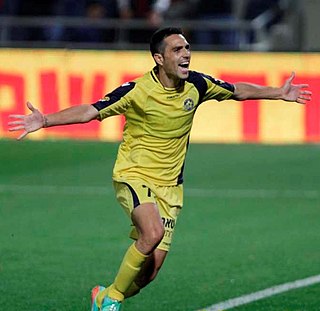
Shenyang Dongjin Football Club was a Chinese football club based in Shenyang, Liaoning and their home stadium is the Shenyang Urban Construction University Stadium that has a seating capacity of 12,000.

The Yuexiushan Stadium is a multi-purpose stadium in Guangzhou, Guangdong, China, named for its location at the foot of Yuexiu Hill. It is currently mostly used for football matches and also sometimes for athletics. It is located on 4 Yingyuan Road.
These are the Records for the Chinese Football League since its inception in 1994.

Eran Zahavi is an Israeli professional footballer who plays as an attacking midfielder or as a striker for PSV Eindhoven and the Israel national football team.
The 2011 China League One is the eighth season of the China League One, the second tier of the Chinese football league pyramid, since its establishment. It began on 26 March 2011 and ended in October 2011.
Zhang Chenglin is a Chinese footballer who currently plays for Chinese Super League side Wuhan Zall on loan from Guangzhou Evergrande.
Li Wenbo is a Chinese footballer who plays as a defender.
Xu Bo is a Chinese footballer.

Liaoning Football Club, officially known as Liaoning Hongyun, was a professional association football club with long history in Chinese football. The club can predate their formation to 1953, when Shenyang government sports body joined existing club Northeast China to play in the Chinese national football league. By 1956, the league was gradually expanded and regional sports institutes' own representatives were allowed, which eventually formed Liaoning Football Club. The club won several titles as well as the 1989–90 Asian Club Championship when they beat Nissan Yokohama in the final, making Liaoning FC the first Chinese club to win an Asian club championship trophy. Since February 26, 1994, the team was established as a full professional football club to play in the 1994 Chinese Jia-A League season, making them one of the founding members of the first fully professionalized top tier league in China.
The 2012 China League One was the ninth season of the China League One, the second tier of the Chinese football league pyramid, since its establishment. It began on March 17, 2012 and ended on October 28, 2012. The size of the league has been expanded from 14 to 16 teams this season.
Wen Chao is a Chinese football player who currently plays for Taizhou Yuanda in the China League One.
Liang Yanfeng is a Chinese football player who currently plays for China League Two side Yanbian Beiguo.
Yu Guijun is a Chinese football player who currently plays for China League Two side Shenzhen Renren.
Shi Xiaotian is a Chinese footballer who currently plays for China League One side Changchun Yatai as a goalkeeper.
Zhao Ming is a Chinese football player.
The 2015 Ping An Chinese Football Association Super League was the 12th season since the establishment of the Chinese Super League, the 22nd season of a professional Association football league and the 54th top-tier league season in China. The league title sponsor was Ping An Insurance. Guangzhou Evergrande Taobao won their fifth consecutive title of the league.

Liaoning Shenyang Urban Football Club is a professional Chinese football club that currently participates in the Chinese League One under licence from the Chinese Football Association (CFA). The team is based in Shenyang and their home stadium is Shenyang Urban Construction University Stadium. .
The 2017 Ping An Chinese Football Association Super League was the 14th season since the establishment of the Chinese Super League. The league title sponsor is Ping An Insurance. Guangzhou Evergrande Taobao won their seventh consecutive title of the league.
The 2017 Guangzhou R&F season is the 7th year in Guangzhou R&F's existence and its 7th season in the Chinese football league, also its 6th season in the top flight.
The Guangzhou Derbies, or Canton Derbies are various local derbies between the football teams of Guangzhou. The term specifically refers to individual matches between the teams, but can also be used to describe the general rivalry between the different clubs. Guangzhou Apollo against Guangzhou Matsunichi (1995–2000) and Guangzhou Evergrande Taobao against Guangzhou R&F are ranked as two of the most ferocious Guangzhou Derbies.





